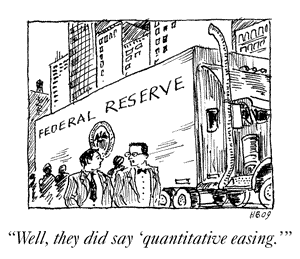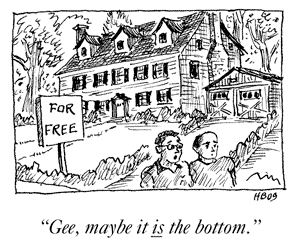Here's my Top 10 links at 10am. I welcome your additions below. I've scattered through today's post a couple of excellent cartoons from Grant's Interest Rate Observer, one of the world's great publications (I'm not kidding). 1. Here's my view at NZHerald.co.nz on how those who want lower bank profits should be careful what they wish for.  2. The history is being written now of those dark days in September when the world came to the brink of a catastrophic financial collapse. This piece in the New York Times' Dealbook reveals what when on behind the scenes when Henry Paulson forced the 9 biggest US banks to accept government money. 3. The US banks are far from out of the woods, and even ratings agencies such as Standard and Poor's are saying this, Dealbook reports.
2. The history is being written now of those dark days in September when the world came to the brink of a catastrophic financial collapse. This piece in the New York Times' Dealbook reveals what when on behind the scenes when Henry Paulson forced the 9 biggest US banks to accept government money. 3. The US banks are far from out of the woods, and even ratings agencies such as Standard and Poor's are saying this, Dealbook reports.
The 19 biggest banks may have passed the Treasury's stress tests on how they would weather a deep recession, but Standard & Poor's, the credit rating agency, thinks that many banks are far from a recovery and that the banking crisis has merely entered a new phase. In a series of reports after the Treasury reported the results of the stress tests, S.&P. has hammered home the point that the nation's banks still face significant headwinds going forward, despite the relatively upbeat report from the government on the state of the banking system. In the short term, banks will still have to contend with losses and troubles associated with the deteriorating economy, S.&P. said. In the long term, it said, tighter government regulation and a greater focus on capital adequacy will hinder the banks' ability to generate the huge profits they were used to.
 4. Reuters reports S&P saying the banking crisis could go on for another 4 years. Here's a taste.
4. Reuters reports S&P saying the banking crisis could go on for another 4 years. Here's a taste.
A day after saying big U.S. banks probably needed to raise only one-fourth the capital demanded by the government, Standard & Poor's said the nation's banking crisis has "merely entered a new phase" and might not end before 2013. The credit rating agency said the industry is being propped up by hundreds of billions of dollars of government support, especially for lenders considered too important to the financial system to fail. While efforts to spur lending, take bad assets off banks' balance sheets, and restart the market for packaging and selling securities may help the sector, S&P said banks will have a tough time surviving absent a bigger capital cushion than regulators require. "There's nothing to say that this banking crisis can't go on for another three or four years," S&P Managing Director Tanya Azarchs said.
5. Nouriel Roubini's RGE Monitor says the green shoots of recovery are more like yellowing weeds.
Many commentators are suggesting that the recent data from the manufacturing, housing market, labor markets suggest that the "˜green shoots' of an economic recovery are blossoming. While there do seem to be some signs of improvement, ie that the pace of contraction has slowed, the most recent data may still suggest that the global economic contraction is still in full swing with a very severe, a deep and protracted U-shaped recession.Although the outlook for global manufacturing and service sectors is still consistent with a significant fall in global GDP, the pace of contraction began to slow towards the end of Q1, even in Europe and Japan which have lagged the U.S. and China. Globally, surveys suggest that the manufacturing outlook has improved from the freefall of the end of Q4 2008 and early 2009. Some emerging economies like China may now be experiencing expansion based on government investment, but those of most advanced economies remain well in contraction territory. In part, inventory adjustment following the sharp destocking could contribute to a revival in demand, but a real increase in end user demand needed for a sustainable fast-paced recovery could be far off. Another necessary condition for a global recovery is a bottoming in not only the U.S. but also global housing markets. So far in most markets, housing prices seem far from their bottom and the outstanding inventory continues to be very high.
6. The Belgian government is considering its second bailout for Belgian bank KBC because it is expected to report a further 1 billion euros in writedowns from toxic debt instruments, the FT.com reports.
A government spokesman confirmed that the country's most senior ministers were meeting to consider further guarantees amid expectations that KBC will write down a further €1bn on its debt portfolio. The bail-out would come on top of a €3.5bn injection in the bank in October , followed up by a further €2bn in January by the Flemish regional government.
7. Gillian Tett is an assistant editor of the Financial Times and has just written a book called Fool's Gold that talks about how JP Morgan Chase was heavily involved in the financial engineering that caused the Credit Crunch, but was clever enough not to get burnt too badly. She also has some sobering words on any banking system recovery in this video on Marketwatch. 8. California is a complete basket case and has asked the US Federal Government for assistance from the TARP, the pot of gold used to bail out banks, , MarketWatch reports. The Mayor of LA has declared a state of emergency, saying the city could run out cash by November the LA Times (which is currently in bankruptcy protection) reports Meanwhile Barack Obama says the US budget deficit is unsustainable and interest rates are likely to rise as foreign lenders demand higher returns in this Bloomberg report. Maybe he should stop borrowing so much then... Here's a taste from the great man. He's right. Long term interest rates are rising. But he should take some of the blame.
President Barack Obama, calling current deficit spending "unsustainable," warned of skyrocketing interest rates for consumers if the U.S. continues to finance government by borrowing from other countries. "We can't keep on just borrowing from China," Obama said at a town-hall meeting in Rio Rancho, New Mexico, outside Albuquerque. "We have to pay interest on that debt, and that means we are mortgaging our children's future with more and more debt." Holders of U.S. debt will eventually "get tired" of buying it, causing interest rates on everything from auto loans to home mortgages to increase, Obama said. "It will have a dampening effect on our economy."
Here's an excellent John Darkow cartoon at the Columbia Daily Tribune.  9. Bloomberg reports that Advanta, a US credit card provider for small businesses, has shut down the accounts of 1 million customers to preserve capital. The 11th biggest credit card group in the United States has cut off the cards so they will not work on new transactions. HT Mish. 10. Here's the now legendary former US regulator William Black talking about the Global Financial Crisis, with Bloomberg. HT Option ARMageddon. A cracking interview for anyone interested in the state of the US banks. Well worth 4 minutes of your time.
9. Bloomberg reports that Advanta, a US credit card provider for small businesses, has shut down the accounts of 1 million customers to preserve capital. The 11th biggest credit card group in the United States has cut off the cards so they will not work on new transactions. HT Mish. 10. Here's the now legendary former US regulator William Black talking about the Global Financial Crisis, with Bloomberg. HT Option ARMageddon. A cracking interview for anyone interested in the state of the US banks. Well worth 4 minutes of your time.

We welcome your comments below. If you are not already registered, please register to comment
Remember we welcome robust, respectful and insightful debate. We don't welcome abusive or defamatory comments and will de-register those repeatedly making such comments. Our current comment policy is here.